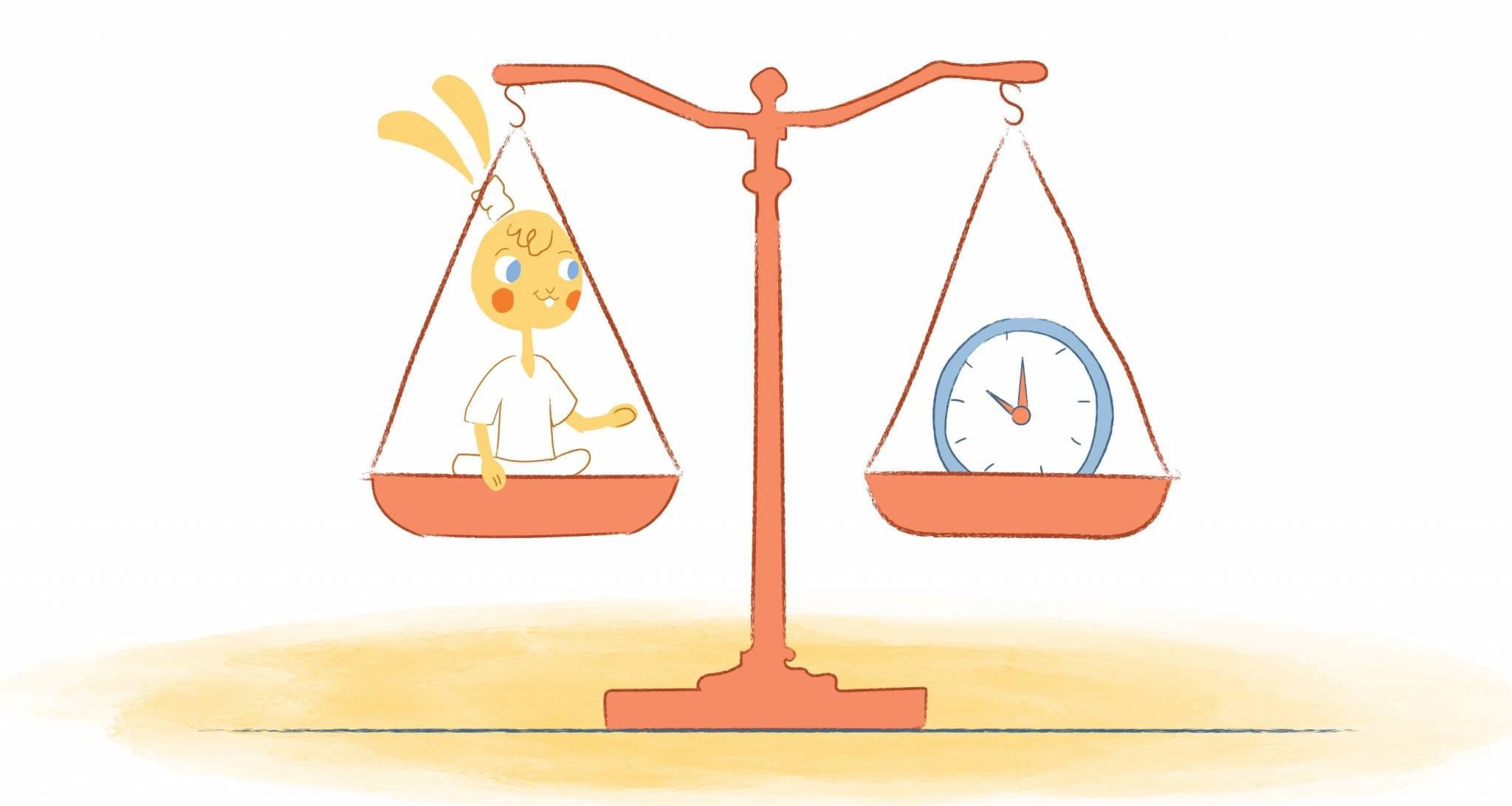

While making a salad for lunch yesterday, I cut my finger while cutting-up a tomato. It wasn’t severe. But, it was just enough for me to proclaim how much of a moron I am. Even though you might not be aware of this, we all engage in a little self-talk occasionally. But, what exactly is self-talk, and what role does it play in being productive? And — is your self-talk more positive or negative? Let’s start to learn practicing positive self-talk.
What is self-talk?
The simplest answer? Self-talk is your inner voice or internal monologue. And, it’s often associated with your self-worth.
Think about it. When you make a mistake, like cutting a finger, you berate yourself for being clumsy. On the flip side, when you get a promotion or beat a deadline, you verbally pat yourself on the back.
Each of these elicits a different response. Negative self-talk makes you feel lousy. Even worse, it can make you feel anxious and depressed.
More interesting, negative self-talk can cause you to lose. Researchers observed 24 tennis players during tournaments. They “found that negative self-talk was associated with losing and that players who reported believing in the utility of self-talk won more points than players who did not.”
Positive self-talk, on the other hand, makes you feel as good as James Brown. Moreover, it boosts your confidence and performance. And, it improves your health.
But, how can you silence negative self-talk and practice positive self-talk? Well, here are 8 strategies that can help.
1. Change your inner dialogue.
It might seem that negative and self-deprecating thoughts appear from nowhere. But, we’re hardwired for negativity. And, when not addressed, this negative bias can impact your behavior, relationships, and decisions.
While you can’t always control these thoughts from automatically appearing, you do have the authority over how you respond to them.
“Believing your self-doubt, worrying incessantly about things you can’t control, and ruminating on the negative will drain you of the mental strength you need to be your best,” explains psychotherapist, mental strength trainer, and best-selling author Amy Morion.
“Reframing your unhelpful thoughts, refusing to dwell on the negative, and purposefully training your brain to think differently. And, this “can help you build mental muscle” as well.
“When you choose to take control over your inner dialogue, you’ll become stronger,” adds Morin. “And the stronger you become, the more likely you are to experience kinder, more productive ways of thinking. It’s a positive cycle that you can create by purposely changing the way you think.”
Build your mental strength.
How can you make this possible? Morin lists the following 7 strategies to help you think more like a mentally strong person;
- Replace BLUE thoughts the those that are true. BLUE is an acronym for “blaming myself, looking for the bad news, unhappy guessing, and exaggeratedly negative thoughts.” Whenever you notice these, “respond with a more realistic statement (or true thought).”
- Change the channel. If you’re ruminating, distract yourself. For example, go for a walk or perform a household chore.
- Argue the opposite. Don’t fixate only on catastrophic outcomes. Also, think about how things might go better than you thought.
- Express gratitude. Regardless if it’s through a journal or taking turns at the dinner table, listing the things that you’re grateful for only takes a couple of minutes. But, it has the power to increase your happiness and change your perspective.
- Be mindful. Living in the moment “reduces stress, improves psychological well-being, and enhances concentration,” writes Morin.
- Ask yourself what you’d say to a trusted friend. “When you’re wrestling with a problem, it can be difficult to find a solution because your emotions affect the way you perceive the issue,” states Morin. “But, it’s much easier to give someone else advice because you’re removed from the situation.”
- Embrace a little self-doubt. Use these feelings to motivate you. Think back to when you were in school studying for an exam. If you felt uneasy about a particular topic, that’s where you would dedicate more time and energy so that you felt more confident.
2. Have a failure mantra.
“Yes, mantras and affirmations can be dorky and new-agey,” writes Katherine Fusco for Success. At the same time, “when you feel overwhelmed, the set and repetitive nature of an affirmation can be a nice way to counter the equally set and repetitive nature of negative self-talk.”
That doesn’t mean you have to go full-on Stuart Smalley. However, scheduling time to rehearse simple phrases like, “I learn through challenges, I am strengthened by this struggle, or even the pithy, No pain, no gain,” might be enough to do the trick.
“Make up your own, post it by your computer,” suggests Fusco. And refer “to that dorky little mantra to bust up the negative thought patterns when they rear their ugly head.” Or, you can use the following four affirmations from Deanna Ritchie In a previous Calendar post;
- “I’m going make today a great day.”
- “I have a lot to offer.”
- “I will never give up.”
- “I’m imperfect, and that’s okay.”
3. Create a “Producer’s Motto.”
Yesterday I really couldn’t get into the work zone. I wasn’t happy about it. But, I told myself, “No biggie, you’ll do this tomorrow.”
Occasional putting things off isn’t always necessarily bad. But, if it becomes a daily habit, you’re just asking for trouble. It’s stressful and could do irreversible harm to your personal and professional reputations.
The fix? Replace “Procrastinator’s Mottos.”
These are self-talks encouraging you to procrastinate, with alternatives that make you take action. These are known as “Producer’s Mottos.” And, here are some examples from Luciano Passuello over at Litemind;
- Go from“I have to” to “I choose To.” “‘I have to’ is every procrastinator’s favorite expression,” writes Passuello.” It’s also the most disempowering.” Instead of saying this, go to the more empowering “I choose to.”
- Finishing vs. starting. “When you focus on finishing something, you direct your attention to a vague, highly idealized future,” he explains. “Visualizing a finished project is motivating for many people, but from the point of view of who’s having a hard time starting a task, visualizing a hard-to-grasp future can be overwhelming — even depressing at times.” Rather, just getting started should be your top strategy.
- Long project vs. short task. Anything you need to do can be broken down into smaller, more manageable tasks. For instance, don’t clean the house; start with the kitchen. Writing a book? Zero-in on one page.
- Important project vs. imperfect step. “Perfectionism arises and only fuels procrastination even more,” adds Passuello. “The way to overcome this mental block is to simply give yourself permission to be human,” he advises. “Allow yourself to be imperfect just in this next small task.”
- “It should be done by now” vs. I’ll feel terrific. “When you say you should be doing something (instead of what you’re actually doing), you focus on comparing an ideal reality with your current, ‘bad’ reality.” A better idea is to think about how awesome it will be after you’ve taken action.
- Need to plow through vs. having time to play. Set boundaries on when it’s time to work and when to play. Make it a point to schedule frequent breaks and leisure time so that you can rest and recharge.
4. Avoid all-or-none thinking.
All or nothing thinking is considered a cognitive distortion. Wich, according to Toni Bernhard J.D., are errors in thinking. By engaging them, you’re evaluating “your life in extreme terms: It’s either perfect or a disaster,” explains Bernhard. “You’re either a total success or a total failure.”
“Going to one of these two extremes when evaluating your life is fertile ground for self-blame and even self-hatred,” she continues. The reason? “What you’re really doing is demanding perfection from yourself, since the only alternative you’re willing to consider is a failure, and no one is happy with that.”
To break this thinking, you first need to evoke self-compassion. No need to overthink this. It’s really just being kind to yourself as opposed to beating yourself up.
Secondly, reflect on what you’re good at. Or, think about what you’ve accomplished. No matter how big or small, you shouldn’t discount the positives.
5. Talk to yourself in the third person.
In the summer of 2010, the world anxiously waited for LeBron James to announce where he would be playing next. ESPN even had a special called, well, “The Decision.” And, while controversial, it was when James let us know that he was taking his talent to South Beach.
Here’s what was interesting, however. James used the third person when explaining his decision. Case in point, “I wanted to do what’s best for LeBron James and to do what makes LeBron James happy.”
Psychologist Ethan Kross picked-up on this. He then decided to explore James’ use of self-distancing. “What we find,” Kross told NPR, “is that a subtle linguistic shift — shifting from ‘I’ to your own name — can have really powerful self-regulatory effects.”
In other words, calling yourself by your own name can reduce anxiety. It can also make you more rational and less emotional. And, it may also encourage you to be a little kinder to yourself.
6. Look for silver linings.
Don’t confuse this with strong-arming positivity in your life. After all, research shows that forced happiness doesn’t work. Rather, this is acknowledging the negative while also seeing the good.
Known as the silver-lining theory, research from NYU found that this can heighten performance. In fact, 90% of people who participated in a study found that their negative traits are actually disguised strengths. These include;
- You’re not shy, but reflective. You take your time making decisions and tap into the power of solitude.
- You aren’t disorganized or sloppy. You’re creative.
- Are you too impulsive? That’s not always a bad thing since hyper-scheduling is stressful and doesn’t leave wiggle room. Also, being spontaneous leads to happiness and makes leisure activities more enjoyable.
- Do you people find you intimidating? That means that you know know what your values are and what you want. That can even help you induce social change.
- Do you believe that you’re irresponsible because you didn’t return a phone call? Maybe that’s because you were spending your time exploring, which makes you happier and self-confident.
- Are you the type of person who doesn’t back down or has to be right? You aren’t stubborn. You’re persistent.
- Rather than believing that you’re inflexible, consider yourself to be organized. As a result, you’re more consistent and reliable. It also makes how you spend your time much easier.
7. Ditch the toxicity.
Speaking of silver-linings, COVID-19 gave me a chance to get reacquainted with my priorities. Why was that important? Because that encouraged me to remove the unnecessary so that what truly matters to me is my sole focal point.
Sure. Pointless meetings and tasks were the first to go. But so were the septic people in my life, such as those who didn’t respect my time.
One such person that I removed was someone who I finally admitted was manipulating me. I woke-up to the fact that they were sabotaging my self-confidence to keep me bound to them. For instance, if I asked for their insight or feedback, they would tell me that my ideas weren’t unrealistic.
I would have welcomed constructive criticism. But, they instead put me down. And, that, at times, leads me down a downward spiral of negative self-talk.
I’ve since made it a point to surround myself with positive and supportive people. Just know that these aren’t “yes” men or women. They’re honest with you, but without making you feel like dirt.
8. Practice makes perfect.
The saying goes, “If you don’t have something nice to say, don’t say anything at all.” Personally, this is excellent advice when interacting with others. So, why not follow this golden rule when it comes to self-talk?
The next time a negative thought pops-up, don’t let it bring you down. Challenge that thought with one that’s more rational, gentle, and encouraging.
However, this isn’t something that you can change overnight. It’s going to take time and lots of practice for positive self-talk. With that in mind, it’s suggested that you begin with one area of your life at a time, such as self-love, health, and wellness, or confidence, and work your way up from there.
Image Credit: rachel. claire; pexels











Deanna Ritchie
Editor-in-Chief at Calendar. Former Editor-in-Chief, ReadWrite, Editor-in-Chief and writer at Startup Grind. Freelance editor at Entrepreneur.com. Deanna loves to help build startups, and guide them to discover the business value of their online content and social media marketing.